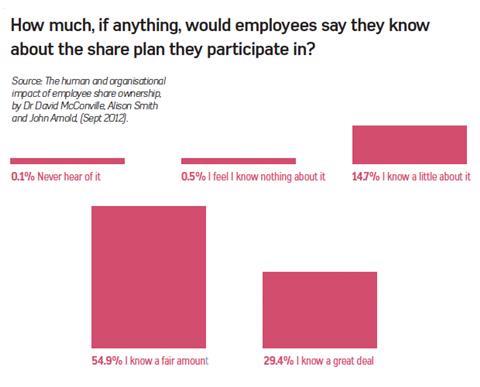
If you read nothing else, read this:
- Last April, the government increased sharesave and share incentive plan (Sip) savings limits from £250 to £500 per month for sharesave and from £125 to £150 for Sips.
- Organisations with Sips are entitled to employer national insurance contribution (NIC) savings and employers are also required to expense options under IFRS2.
- A good share plan can reportedly help boost productivity, engagement, recruitment and aid retention.
According to Martyn Drake, managing director at Computershare Plan Management, there has definitely been an increase in share scheme take-up, both on the employer and participant sides over the past few years. “[Employers] have introduced or amended plans because they have more confidence in the economy and the [sharesave] and share incentive plan (Sip) savings limits have increased thanks to changes the government made last April,” he says.
These changes saw savings limits rise from £250 to £500 per month for sharesave schemes and from £125 to £150 for Sips.
The business case for share plans is pretty clear, adds Drake. “Employees who take part in share plans take less time off, work longer hours, are more motivated and are more likely to stay with the [employer],” he says.
According to research by Computershare and the London School of Economics, published in September 2014, third (36%) of the 3,800 respondents said that a share plan was likely to help attract talented people to the organisation and four in 10 (43%) said that they would be more likely to recommend the firm to a friend if it had a good share plan.
Boost take-up figures
So how can employers boost take-up among their workforce? Simon Stafford, head of relationship management at Capita Asset Services, says many employees have come to expect these as part of their employee benefits package. “We’ve noticed that employee awareness of share plans has grown in the last few years, leading to an expectation that they are included in employee benefits,” he says.
Share plans can also help to boost engagement if they are communicated effectively. “Through intelligent plan design and communication, [employers] can encourage employees to share in the organisation’s vision and objectives,” says Stafford.
Pointing out the tax advantages to employees could also work in an employer’s favour. Many share schemes, including company share option plans (Csops), sharesave schemes and Sips, are favourable for employers and employees alike. For employees, the link to transferring shares to individual savings accounts (Isas) within 90 days of release can be an effective way of avoiding capital gains tax. And employers offering Sips are entitled to employer national insurance contribution (NIC) savings, although there is a requirement to expense options under IFRS2.
Effective scheme communication
It’s also vital to make sure a scheme is communicated effectively and ensure that employees know what’s on offer to them. “The success of a scheme is underpinned by two fundamentals: firstly, accurate systems and processes and, secondly, amazing communications,” says Drake. “Understanding how to present, explain and embed an employee share plan using tailored communications is imperative. If [employers] don’t get their communications right, their share plan will fall at one of its first hurdles. If [employers] do get it right, then they will be able to drive up participation, particularly on larger broad-based plans, and will reap all the rewards that come with that level of staff engagement.”
Stafford agrees: “Don’t underestimate the importance of awareness and educational communications; they can have a major impact on share plan take-up.”
Phil Ainsley, managing director of employee services at Equiniti, says the surge in interest in share plans is also down to a number of other factors. “Market issues and the increases in market share values have had an impact and successful share plan maturities have increased confidence among employees,” he says.
However, there are several issues that could hinder growth in the share plan market. These include the fact that the share price has fallen in some organisations and there have been sharesave scale-backs.
But despite the challenges, actively taking steps to boost take up of share plans can prove beneficial for both employers and employees.

Case study: Asda boosts sharesave take-up

Asda has made its sharesave scheme an integral part of its reward strategy in order to boost take-up.
Simon Bell, senior reward manager at the supermarket behemoth, explains: “Our sharesave scheme plays a key part of our reward strategy and we openly encourage participation throughout our organisation from hourly-paid and salaried colleagues to board members.”
Before designing its 2014 sharesave campaign, Asda carried out face-to-face research with a broad section of employees to test their understanding of the company’s share plan and how effective they find the communication.
“One of the clear messages we received was that now our business is diversifying, colleagues have a strong affinity with their part of the company and want to see things that are familiar and relevant to them reflected in our communications material, even down to the uniforms that [employees] wear,” says Bell.
“Our material needed to be representative in order to encourage participation across the board. They also told us that they frequently make decisions based upon endorsements by their peers. This meant drawing on real-life examples and anecdotes from [employees] in each part of the business to better reflect the experience of their peer group.”
One of the main challenges is to successfully connect with all of the 170,000 colleagues. This year, Asda used a blend of tried-and-tested methods as well as new approaches. “Of paramount importance was the use of clear, simple language and strong visuals to make the subject matter easy to understand and readily accessible to every [employee],” explains Bell. “Our 2014 sharesave plan take-up increased by 8.6% on the previous year.”
After reviewing enrolment methods to make it easier for staff members to participate, this year 77% of Asda employees enrolled using SMS text compared with 23% joining online.
Bell says that Asda’s key tips for sharesave success are to create clear, simple and relevant communication and to create a brand. “Ours is the sharesave Asda piggy bank that appears in all our communications,” he says.
Making sign-up as straightforward as possible is also key.











